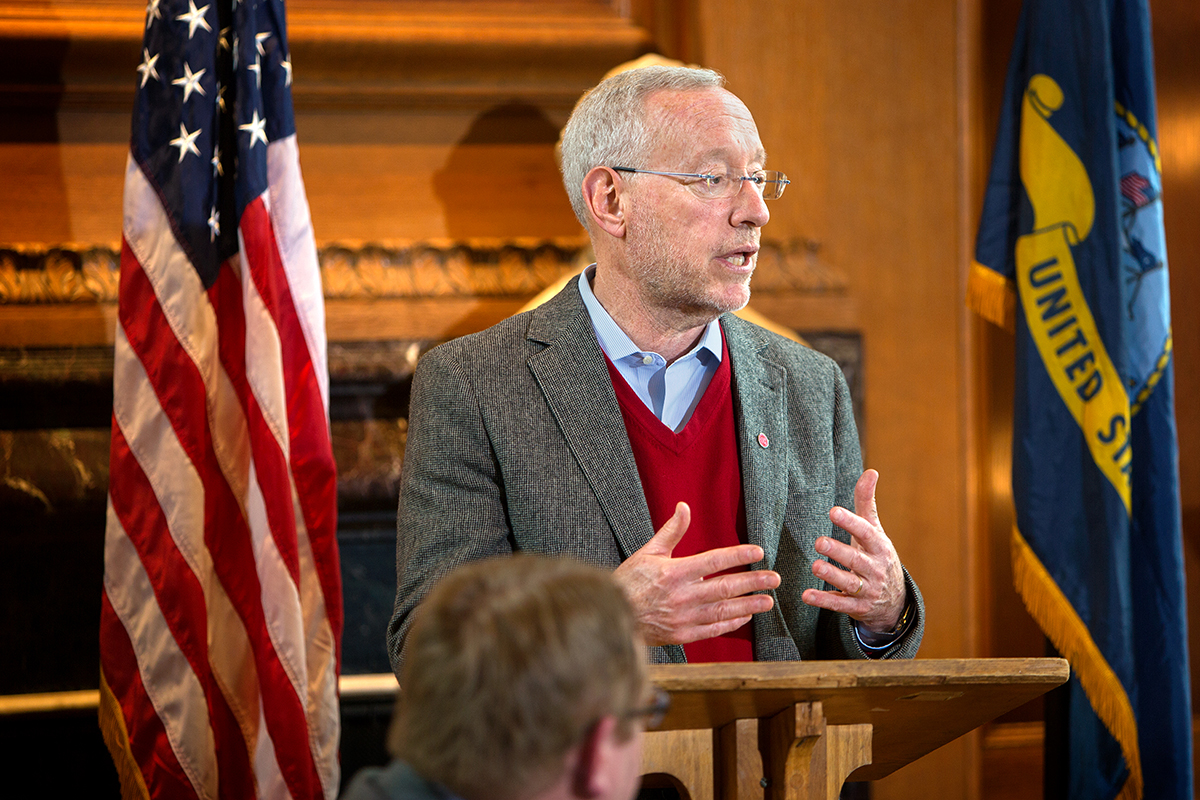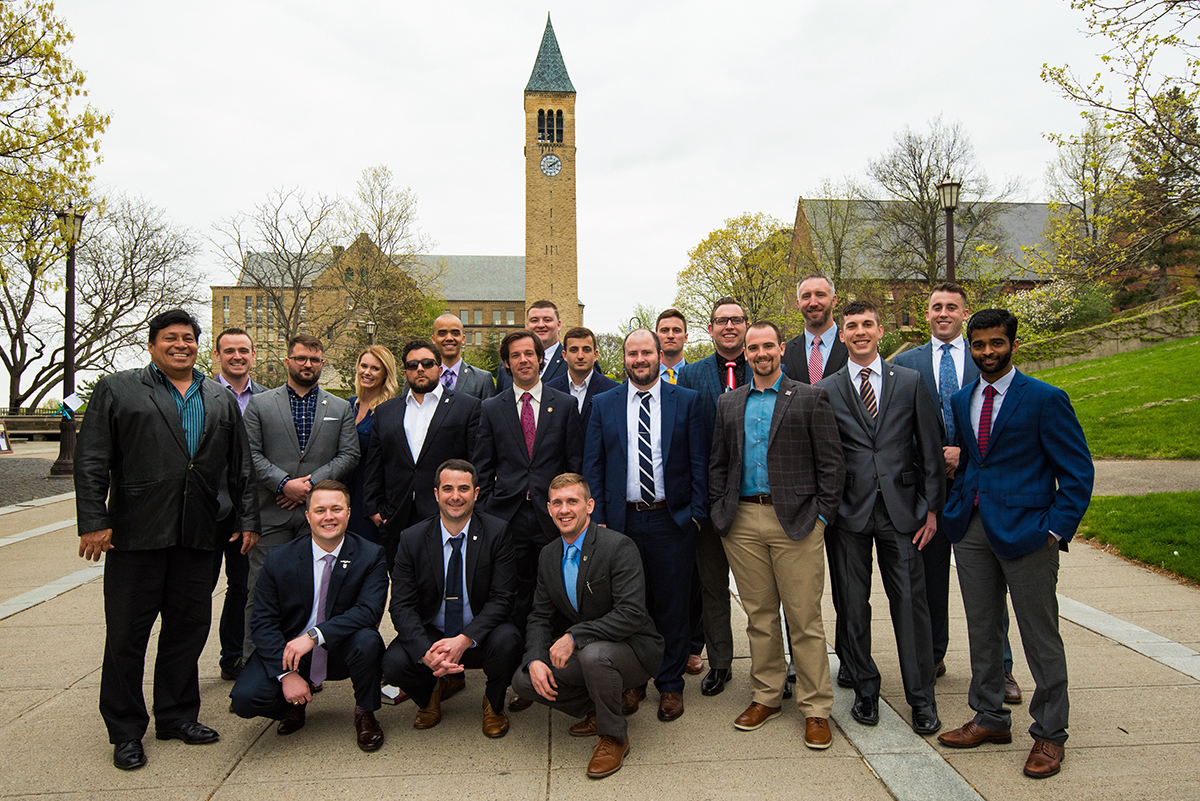Provost commits to increasing number of student veterans
By Nancy Doolittle

Cornell hopes to enroll 100 military veterans in the university’s undergraduate programs over the next three years, Provost Michael Kotlikoff announced at the Ivy League Veterans Council (ILVC) meeting April 29. This would more than quadruple the 24 undergraduate student veterans currently attending the university.
It is the latest step the university has taken, working with student veterans, to overcome a challenge faced by all Ivy League institutions: to increase their service to student veterans and help them integrate into university life.
“Veteran applicants often have overcome significant adversity and excel at the university – and many are first generation and underrepresented minorities who also add to the diversity of experiences within our student body,” Kotlikoff said. “This goal is part of the efforts of the university to continue to fulfill our ‘any person’ legacy and leverages Cornell’s commitment to markedly enhance undergraduate financial aid. Together with recent commitments to support veterans once they are on campus, we hope to significantly increase the opportunities for individuals who have served in uniform.”
The Cornell Undergraduate Veterans Association (CUVA) hosted the meeting of the ILVC, which was founded in 2015 to study, address and improve representation by U.S. military veterans in the student populations of elite academic institutions. In attendance were student veterans from Cornell, Brown, Columbia, Dartmouth, Yale and Stanford.
As part of its land-grant mission, Cornell has offered military science instruction since its inception. Only recently, however, have undergraduate student veterans had an official university voice, when Seamus Murphy ’16, U.S. Army veteran, and David Outlaw Jr. ’17, a U.S. Navy veteran, formed CUVA in 2015.
Student veterans face a number of challenges transitioning from military to academic life, Outlaw said. Many are not familiar with higher education environments, and sometimes university processes are out of sync with the procedures of the U.S. Department of Defense. Often, student veterans find they need to educate their peers, faculty and staff, who may have preconceived ideas about the military.
CUVA has worked with Cornell administrators to address a number of these challenges.

For instance, in December 2015, CUVA met with Barbara Knuth, senior vice provost and dean of the graduate school; Jason Locke, associate vice provost for enrollment; and Cassie Dembosky, university registrar, to address how the financial aid process could be improved to dovetail better with the Yellow Ribbon Program and other federal funding processes, and the need for earlier enrollment certifications with the Department of Veterans Affairs, which provides housing and book stipends to student veterans. The financial aid and registrar offices made changes effective this summer.
The new Veterans at Cornell admissions website makes it easier for prospective applicants to learn about Cornell and the benefits the university offers veterans, and to access those benefits once enrolled. It also includes profiles of current student veterans and highlights articles focused on veterans at Cornell. Another website, Cornell’s Military Community, connects the veteran community at Cornell.
CUVA also worked with Student and Campus Life and Alumni Affairs and Development to fund a veterans’ advocate position and office. This position will serve all student veterans, providing support, advocacy, programming and referral.
“Cornell has been quite responsive in eliminating barriers and developing resources that can help with our transition,” Outlaw said. “Now we want to promote Cornell as a university that leads from the front in attracting student veterans, which will enhance our feeling of genuinely belonging at Cornell.”
He added, “That begins with getting word out that, even though a veteran may not have gone right from high school to college, he or she should still consider applying to Cornell.” This past month, CUVA joined Student Veterans of America, a coalition that provides veterans with tools to achieve their academic goals and find meaningful employment.
Admissions continues to ramp up its veteran recruitment initiatives, Locke said. CUVA is collaborating with Undergraduate Admissions on a new recruitment brochure, and all admitted veterans are personally contacted by individuals from the Admissions Office and CUVA. There are also plans for a livestream event for veterans in the fall, Locke said.
Last year, Cornell also became a founding partner in VetLink, a program associated with Service to School, a nonprofit that provides free college application counseling to military veterans. Cornell admissions officers pre-screen candidates identified by VetLink and provide feedback on their potential for admission. In its inaugural year, Cornell admitted eight veterans that were identified by VetLink. The goal is to increase that number dramatically in the coming years.
The university also hosts the Warrior-Scholar Project, a one-week intensive “boot camp” of classes, reading and writing to help veterans decide if they want to pursue a degree. Two graduates from the Warrior Scholar Project have enrolled at Cornell.
“With the provost’s commitment to significantly increase the ranks of undergraduate student veterans, I feel confident that the work that we began on behalf of undergraduate student veterans will continue, and I look forward, as a soon-to-be alumnus, to supporting a growing number of student veterans in the future,” said Outlaw.
Media Contact
Get Cornell news delivered right to your inbox.
Subscribe